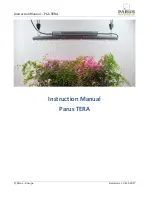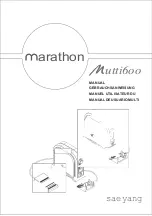
9
c.
Wash with a commercial (bacterial-germicidal) disinfectant. Follow
disinfectant manufacturer’s recommended instructions and dilution rates
carefully.
CLEAN SUCTION UNIT AND COLLECTION BOTTLE LID
1. Disconnect the suction unit from all external power sources.
2. Wipe the suction unit housing and collection bottle lid with clean cloth
and any commercial (bacterial-germicidal) disinfectant. Follow disinfectant
manufacturer’s recommended instructions and dilution rates carefully.
CAUTION
DO NOT
submerge in water as this will result in severe
damage to the vacuum pump.
DO NOT
clean with
powder-type cleaning agents or soap.
CLEAN TUBING
1. Disconnect the tubing from the unit.
2. Tubing should be rinsed thoroughly after every use by running hot tap water
through it followed by a solution of one part vinegar to three parts hot water.
3. Rinse with hot tap water and air dry.
4. Keep the outer surface of the tubing clean by wiping with a clean, damp cloth.
WARNING
The waste in collection bottle may cause respiratory
infection, which must be handled according to medical
waste disposing regulation. Operator must wear gloves and
medical-class mask before cleaning the collection tubing
and handling the collection bottle and/or accessories.
MAINTENANCE
MAINTENANCE
Before each use, inspect power cord for fraying/damage and all accessories
(collection canister, tubing and microbial filter) for cracks/leaks.
DANGER
• Electric shock hazard
• Do not attempt to open or remove the suction cabinet. If
a service is required, return your suction to an authorized
service center. Opening or tampering with the unit will
void warranty.
CHANGING THE FILTER
1. Filter should be replaced every two months. If overflow occurs, change the
filter immediately.
2. Remove filter by disconnecting it from tubing connected to pressure adjusting
valve and tubing connected to collection lid assembly.










































